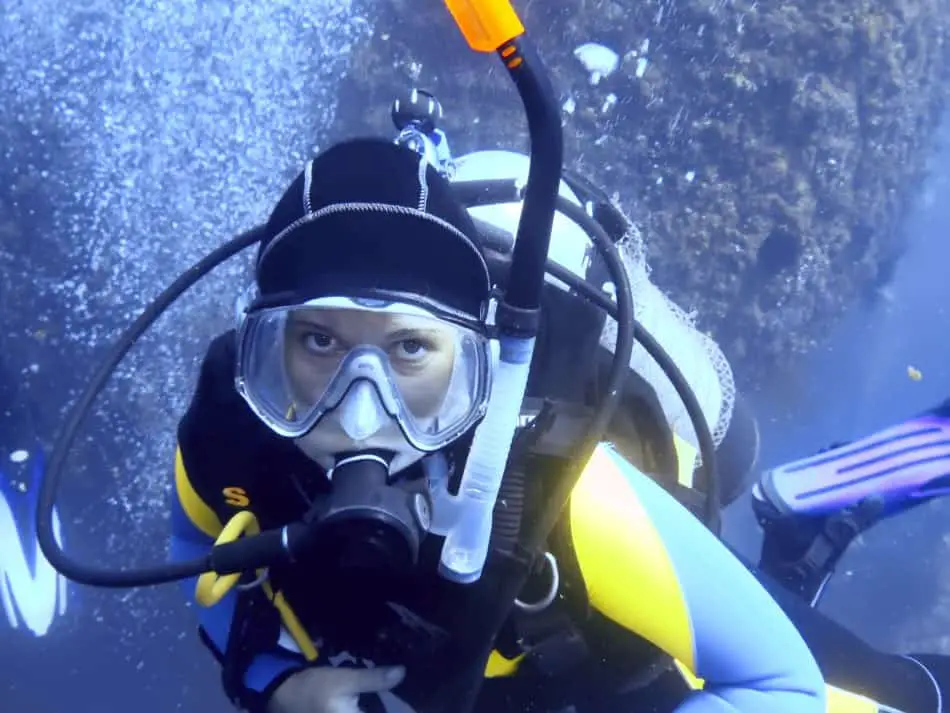Can You Scuba Dive If You Have Asthma?
Scuba diving is an inclusive sport that can be enjoyed by children and adults alike. However, physically fit and free from any medical conditions is a basic requirement for scuba diving.
Can you scuba dive if you have asthma? You can if your asthma is not very severe. You also have to consult a medical professional who can help you find out whether it’s safe to dive. Asthma does negatively impact your breathing capabilities which can in the worst case be dangerous when diving.
There are certain medical conditions where you can still scuba dive but the risk of injury or drowning is much higher. Whether or not you can dive while you have asthma is a long-standing debate so let’s break it down.
Diving Concerns for Asthma Patients
Asthma patients have narrowed breathing tubes and may suffer from shortened breath and a feeling of suffocation which may be triggered by mild illnesses like a cold, certain allergies or being in confined spaces. In extreme cases, patients may suffer from asthma attacks which can be life-threatening if not treated immediately.
Scuba divers have to deal with a reduced breathing capacity because of using compressed air and a regulator for breathing as well as dealing with internal resistance due to increased density underwater. This is much worse for people with asthma who already have a low breathing capacity which just worsens underwater. Because of the narrow breathing passage, gases may become trapped in the diver’s body and will eventually expand and damage their lungs.
Experts also point out that it is not possible to stop and catch your breath underwater if you suddenly find yourself gasping for air. Sudden shortness of breath, distress and exhaustion can trigger an asthma attack underwater which may cause a person to drown. In fact, there have been divers with asthma who have died underwater, but there isn’t enough evidence to support the fact that this was the main cause of death.
Decompression sickness is something all divers have to be wary of (it is characterized by the expansion of gas bubbles inside the body due to inhalation of highly pressurized gas which can cause joint pains, cramps etc.), but asthma patients tend to face a higher risk of suffering from it.
Pollen from underwater plants can trigger asthma attacks in patients with allergies. A sudden shortness of breath can be life-threatening for a diver with asthma.

Restrictions for Divers with Asthma
While a majority of doctors strictly advise against diving with asthma, there is another group which suggests that asthma patients can scuba dive with certain restrictions:
· Asthma should be mild enough for the diver to not require a bronchodilator in less than forty-eight hours.
· The patient’s asthma must not be the kind which is triggered due to exercise, flu or emotional distress.
In certain countries, all divers must undergo a lung test to ensure that they are free from problems like asthma in order to scuba dive. This is to avoid registering divers who lie about their medical conditions.
Types of Asthma
Asthma varies in severity and there are four basic levels of asthma:
- Mild Intermittent: characterized by a 20% lower flow of air through the breathing tubes. Shortness of breath and attacks are extremely rare and patients can make use of a bronchodilator only when they experience any problems (as opposed to continued, prolonged treatment).
- Mild persistent: Symptoms may occur a few times a week. Shortening of breath at night is rare and may occur a few times a month. Using bronchodilators daily helps to reduce the symptoms.
- Moderate persistent: air flow through the lungs is in a range of 60-80% and symptoms may be experienced more than once a day. This type of asthma is also characterized by a chronic cough, particularly at night or while exercising. Medication, both oral and inhaled as well bronchodilators are required by patients on a daily basis.
- Severe persistent: the flow of air through lungs is 60% or less and the symptoms are very severe and may physically restrict the patient from performing certain activities. Steroids and long-acting bronchodilators are a must for patients with severe persistent asthma.
For patients falling in any of the first three categories, scuba diving is possible provided that they follow recommended guidelines and restrictions.
Before considering diving with asthma, patients must address 2 questions:
- How severe is the asthma?
- Is it under control to the extent that the patient can dive underwater without experiencing a sudden attack?
For certain patients, their asthma is treatable and curable to some extent. A lung function test combined with a fitness test (ability to exercise without experiencing shortness of breath) needs to be conducted to ensure that the asthma patient is fit to scuba dive.

Precautions for Patients with Asthma
Scuba divers with asthma must follow certain precautionary measures to avoid sudden asthma attacks and the risk of drowning.
They must undergo a complete physical exam accompanied by a spirometry test. At rest and with a certain amount of exercise, an asthma patient’s spirometry results must be normal. Abnormalities in the result will render the patient as being unfit to dive. The asthma should be mild to moderate and easily controlled by medication. If a diver has required an inhaler urgently a short time before their dive, it is advisable to avoid going underwater.
Even asthma patients who are fit to dive must read up on the risks associated with diving in their medical condition as these problems can be life-threatening. Frequent divers should also consult a professional from time to time to ensure that there haven’t been any new developments which may prevent them from diving. In fact, it is recommended that asthma patients should use an inhaler at least half an hour before their dive as a security measure to avoid the risk of suffocation once they dive.
A Final Word of Caution
While it is not ideal for patients with asthma to scuba dive, those who still wish to do so must be extremely careful. They should be accompanied by a dive buddy or professional who can assist them in case an emergency arises to avoid any disasters.
Divers must be honest about their medical condition and get tested to ensure that their spirometry results are normal. They should also avoid deep diving because this will increase the risk of decompression diving. Shallow recreational diving is a safer option.
At the end of the day, it’s a personal choice, but make sure you put your safety first.

